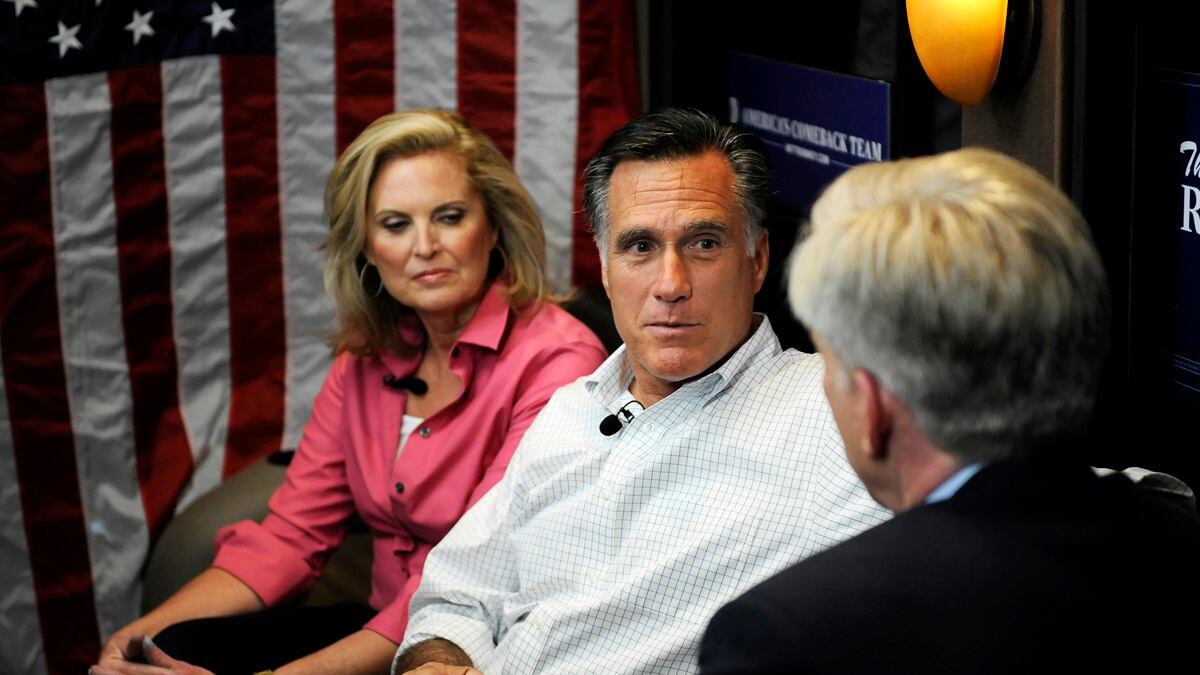
Now we know why Mitt Romney avoided the Sunday talk shows for so long.
His appearance on Meet the Press left him with a muddled message, exactly what he didn’t need as the campaign kicks into overdrive after the conventions.
A candidate has to be prepared for more sustained questioning on a Sunday show than in the typical quick-hit cable appearance. And if there was one topic on which Romney should have honed his answers, it is Obamacare.
Yet there he was, telling David Gregory he didn’t want to jettison the most popular parts of the president’s health-care law.
“Well, of course not,” Romney said. He would replace the law with “my own plan. And even in Massachusetts”—which he rarely mentions!—“our plan there deals with preexisting conditions and with young people.” Then he doubled down:
“Well, I'm not getting rid of all of health-care reform. Of course there are a number of things that I like in health-care reform that I’m going to put in place. One is to make sure that those with preexisting conditions can get coverage. Two is to assure that the marketplace allows for individuals to have policies that cover their family up to whatever age they might like.”
It was a striking moment. Was Romney moving to the center? Was this a deliberate attempt to soften his constantly repeated refrain that Obamacare is an abomination? Was he now prepared to talk about his bipartisan record as governor? Or did he just want to avoid looking heartless when Gregory asked him about an approach that would kick many people off health insurance?
Whatever Romney’s motivation, his position didn’t last long. Hours later, a Romney aide told National Review “that there had been no change in Romney’s position and that ‘in a competitive environment, the marketplace will make available plans that include coverage for what there is demand for. He was not proposing a federal mandate to require insurance plans to offer those particular features.’”
Leave aside whether it’s realistic to expect the “marketplace” to provide what it conspicuously failed to provide before Obamacare. Or that a federal study says the number of young adults without health insurance dropped by one-sixth last year.
How does Romney give that answer on national television and force his campaign into what-he-really-meant-to-say mode?
This isn’t just any subject, of course. The former governor spent the GOP primaries denying that Romneycare had laid the foundation for Obamacare, though his answer rested on the nuance of a state mandate (to prevent people from signing up after they get sick) being OK and a federal mandate being a heavy-handed intrusion. With his Meet the Press moment, Romney looks like he had flipped again—until his campaign reverted to its original position.
Romney has talked about preexisting conditions before. Last June, the campaign put out a statement saying, “Governor Romney supports reforms to protect those with preexisting conditions from being denied access to a health plan while they have continuous coverage”—those last five words applying only to those who are already comfortably covered, most likely through their jobs.
The Sunday interview was a reminder that while the Obamacare label remains politically toxic, individual chunks have broad appeal—broad enough that Romney didn’t want to appear insensitive to the plight of those who would lose coverage.
Romney also created confusion when he refused to say which tax loopholes he would close as part of his budget plan. While postponing painful proposals until after the election is a standard political dodge, it is a particular problem in Romney’s case because of a spate of news stories and analysts saying his numbers don’t add up. That is, you can’t promise to cut taxes for everyone, protect the middle class from tax hikes, cancel deep defense cutbacks, and not increase the budget deficit. Romney’s answer is closing unspecified loopholes, but when pressed by Gregory, he punted. What’s more, the Romney camp has already ruled out tampering with two of the biggest loopholes, the mortgage-interest tax deduction and write-offs for investment income.
Romney did take half a step toward boldness on NBC. When he started ripping Obama for the automatic defense cuts that will kick in at year’s end under the 2011 budget deal, Gregory rightly noted that Republicans had approved that deal as the country was on the brink of default. A “big mistake” by the GOP, Romney said, which could be a neat bit of triangulation against the party’s unpopular congressional wing—except that his running mate, Paul Ryan, voted for the agreement. Which is why we probably won’t hear much more about it.
In the larger scheme of things, a misstep or two on a Sunday show doesn’t amount to much. Most people will undoubtedly vote based on whether they think Romney can fix the economy, not by parsing his views on health-care rules. But such episodes feed the narrative that Romney’s policy infidelity is itself a preexisting condition.






